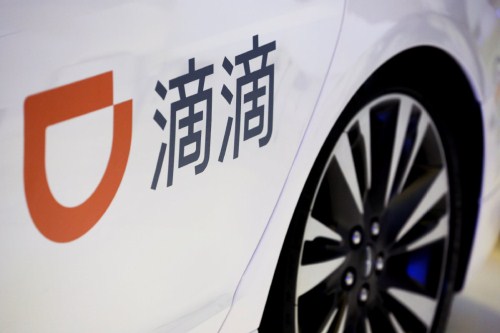| 
The company logo of the Didi ride-hailing app is seen on a car door at the IEEV New Energy Vehicles Exhibition in Beijing, Oct 18, 2018. [Photo/Agencies] China's leading online ride-hailing platform Didi Chuxing announced plans to start a deposit-free policy on its car-sharing platforms in the East China cities of Hangzhou and Ningbo, and will expand this model to more cities nationwide, according to a report by Beijing Daily. The move, amid a difficult time for some car- and bicycle-sharing counterparts, has shed some new light on the car-sharing industry. Newly registered users in both cities can use shared cars directly without paying any deposit, and old users who have deposited funds in the platform can withdraw the funds starting Jan 10, or transfer them to enjoy other services on Didi's platform. A Chery EQ1 model on Didi's car-sharing platform costs 0.59 yuan per minute, or less than 18 yuan ($2.64) for 30 minutes in Hangzhou, East China's Zhejiang province. The two cities now own more than 1,500 cars for sharing, with over 450 pickup and return stations, covering shopping malls, supermarkets, office buildings, airports, train stations and communities. Users are required to input their ID number and driver's license information for real-name authentication for registration, with facial recognition a must before each use for security concerns. Internet of vehicles sensing technology will also detect dangerous driving behaviors such as emergency braking and abnormal parking to ensure driving safety, said the report, adding that the car-sharing platform will automatically send any traffic violation alert to users via SMS. With all this technological support, the operation future of Didi Chuxing's car-sharing platform still remains to be seen, as many of its predecessors, both in car sharing and bicycle sharing, are experiencing an extreme winter due to funding shortfalls and mismanagement. The Beijing-based Togo, an internet car-sharing company founded in July 2015, was once considered a dark horse in the industry as it raised around 500 million yuan and expanded into the markets of Beijing, Shanghai, Guangzhou, Shenzhen and Chengdu in just two years. However, since Togo's withdrawal from the Nanjing market, consumers have found it very difficult to get a refund on their deposits, as the company has limited the quota on deposit refunds to only 15 people per day. | 
 News
News Business
Business Education
Education Travel
Travel Photos
Photos





